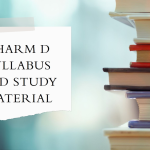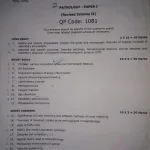Microbiology is an essential subject for healthcare students, offering a deep understanding of microorganisms, diseases, and their impact on health. Questions range from basic microbiological concepts to applied clinical knowledge, helping students excel in exams. Below are comprehensive questions and answers for RGUHS microbiology exams, covering all topics with clarity and precision.
General Microbiology
Question: What is microbiology?
Answer: Microbiology is the study of microorganisms, including bacteria, viruses, fungi, and protozoa, focusing on their biology, physiology, and role in disease.
Question: Who is considered the father of microbiology?
Answer: Antonie van Leeuwenhoek is known as the father of microbiology for his pioneering work in observing microorganisms.
Question: What is the difference between prokaryotic and eukaryotic cells?
Answer: Prokaryotic cells lack a nucleus and membrane-bound organelles, while eukaryotic cells have both.
Question: What is aseptic technique?
Answer: Aseptic technique involves practices that prevent contamination of cultures, samples, and the environment.
Question: What are Koch’s postulates?
Answer: Koch’s postulates are criteria used to establish a causal relationship between a microbe and a disease.
Question: What is the function of a bacterial cell wall?
Answer: The bacterial cell wall provides structure, protection, and maintains the cell’s shape.
Question: What is the Gram staining technique?
Answer: Gram staining differentiates bacteria into Gram-positive and Gram-negative based on their cell wall composition.
Question: What is the purpose of culture media?
Answer: Culture media support the growth of microorganisms in laboratory settings.
Question: What are the phases of bacterial growth?
Answer: The phases include lag, log, stationary, and death phases.
Question: What is sterilization?
Answer: Sterilization is the process of eliminating all microorganisms from an object or environment.
Question: What is a pathogen?
Answer: A pathogen is a microorganism capable of causing disease.
Question: What is the role of endotoxins in bacterial infections?
Answer: Endotoxins, released by Gram-negative bacteria, trigger inflammatory responses and can cause septic shock.
Question: What is the difference between an obligate aerobe and an obligate anaerobe?
Answer: Obligate aerobes require oxygen for growth, while obligate anaerobes grow only in the absence of oxygen.
Question: What is a nosocomial infection?
Answer: Nosocomial infections are infections acquired in healthcare settings.
Question: What is the importance of plasmids in bacteria?
Answer: Plasmids carry extra-chromosomal DNA, often encoding antibiotic resistance or other survival traits.
Question: What is the function of pili in bacteria?
Answer: Pili help bacteria adhere to surfaces and facilitate genetic exchange through conjugation.
Question: What is a biofilm?
Answer: A biofilm is a community of microorganisms encased in a protective matrix, adhering to surfaces.
Question: What is the significance of quorum sensing in bacteria?
Answer: Quorum sensing allows bacteria to communicate and coordinate group behaviors like biofilm formation.
Question: What is the principle of autoclaving?
Answer: Autoclaving sterilizes using high-pressure saturated steam to kill microorganisms.
Immunology
Question: What is immunity?
Answer: Immunity is the body’s ability to resist infections and toxins.
Question: What are the primary immune organs?
Answer: The primary immune organs are the thymus and bone marrow.
Question: What is the role of macrophages in immunity?
Answer: Macrophages engulf and digest pathogens and present antigens to T cells.
Question: What are antigens?
Answer: Antigens are molecules that trigger an immune response.
Question: What is the complement system?
Answer: The complement system is a group of proteins that enhance immune responses and lyse pathogens.
Question: What is the role of B cells?
Answer: B cells produce antibodies to neutralize pathogens.
Question: What are T cells, and how are they classified?
Answer: T cells are lymphocytes classified as helper, cytotoxic, and regulatory based on their function.
Question: What is passive immunity?
Answer: Passive immunity occurs when antibodies are transferred from another source, like maternal antibodies.
Question: What is an autoimmune disease?
Answer: Autoimmune diseases occur when the immune system attacks the body’s own cells.
Question: What is the purpose of vaccines?
Answer: Vaccines stimulate the immune system to develop immunity against specific pathogens.
Question: What is the function of cytokines?
Answer: Cytokines are signaling proteins that regulate immune and inflammatory responses.
Question: What is hypersensitivity?
Answer: Hypersensitivity is an exaggerated immune response to harmless antigens.
Question: What is the role of natural killer cells?
Answer: Natural killer cells destroy infected and tumor cells without prior sensitization.
Question: What are monoclonal antibodies?
Answer: Monoclonal antibodies are lab-generated antibodies targeting specific antigens.
Question: What is herd immunity?
Answer: Herd immunity occurs when a large portion of a population is immune, reducing disease spread.
Question: What is immunological memory?
Answer: Immunological memory enables faster and stronger responses upon re-exposure to an antigen.
Question: What is the role of mast cells in allergy?
Answer: Mast cells release histamine during allergic reactions.
Question: What are immunoglobulins?
Answer: Immunoglobulins are antibodies that recognize and bind antigens.
Question: What is the difference between innate and adaptive immunity?
Answer: Innate immunity provides immediate defense, while adaptive immunity is specific and develops over time.
Clinical Microbiology
Question: What is the causative agent of tuberculosis?
Answer: Mycobacterium tuberculosis causes tuberculosis.
Question: What is the significance of MRSA in clinical settings?
Answer: MRSA is resistant to methicillin and poses challenges in treatment.
Question: What is the laboratory diagnosis for malaria?
Answer: Malaria is diagnosed using peripheral blood smears and antigen detection tests.
Question: What is the difference between septicemia and bacteremia?
Answer: Bacteremia is the presence of bacteria in blood, while septicemia involves systemic infection and inflammation.
Question: What is the causative agent of syphilis?
Answer: Treponema pallidum causes syphilis.
Question: What is the Ziehl-Neelsen stain used for?
Answer: The Ziehl-Neelsen stain identifies acid-fast bacteria like Mycobacterium.
Question: What are fungal infections called?
Answer: Fungal infections are called mycoses.
Question: What is a superantigen?
Answer: A superantigen triggers an excessive immune response by binding directly to T cells.
Question: What is the causative agent of typhoid fever?
Answer: Salmonella typhi causes typhoid fever.
Question: How is HIV diagnosed?
Answer: HIV is diagnosed using ELISA, Western blot, or PCR tests.
Question: What is the role of a microbiological culture in diagnosis?
Answer: Cultures help identify pathogens and guide treatment.
Question: What is an opportunistic infection?
Answer: Opportunistic infections occur in immunocompromised individuals, caused by normally harmless microbes.
Question: What is the causative agent of cholera?
Answer: Vibrio cholerae causes cholera.
Question: What is the purpose of antimicrobial susceptibility testing?
Answer: It determines the effectiveness of antibiotics against specific pathogens.
Question: What is a nosocomial pathogen?
Answer: Nosocomial pathogens cause hospital-acquired infections.
Question: What is the causative agent of leprosy?
Answer: Mycobacterium leprae causes leprosy.
Question: What is a dimorphic fungus?
Answer: Dimorphic fungi can exist as yeast or mold depending on temperature.
Question: What is the difference between bacteriostatic and bactericidal antibiotics?
Answer: Bacteriostatic antibiotics inhibit bacterial growth, while bactericidal antibiotics kill bacteria.
Question: What is the principle of the Widal test?
Answer: The Widal test detects antibodies against Salmonella antigens.
Microbiology plays a critical role in understanding diseases, improving diagnostics, and advancing healthcare. Preparing thoroughly for RGUHS microbiology exams ensures a solid grasp of essential topics and concepts.
Latest Posts
- Step-by-step guide to download and apply for jee mains admit card 202
- Comprehensive 2025 government holidays and recruitment details for job seekers
- JEE Mains Admit Card 2025: Your Step-by-Step Guide to Downloading the Hall Ticket
- Everything You Need to Know About 2025 Government Holidays Recruitment
- Comprehensive Guide to rrb d group recruitment 2025 – Eligibility, Vacancies, and Application
- Detailed guide to nps trust recruitment 2025 vacancies, eligibility and apply process
- Comprehensive guide to hpcl recruitment 2025 notification, vacancies, and application process
- ignou bed admission 2025 complete recruitment guide with eligibility and process
- Comprehensive Guide to Indian Army Agniveer Recruitment 2025 Notification and Jobs
- Everything You Must Know About CBSE Board Exams 2025 Changes & New Rules






